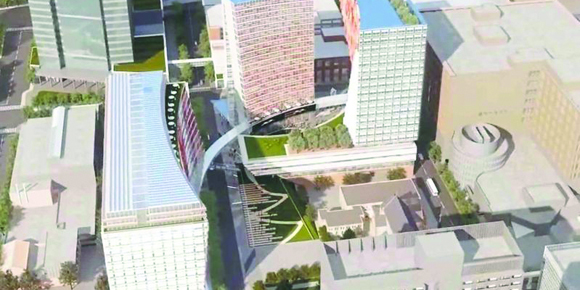Over the past month or two, there’s been much discussion regarding the potential impact of growth fees on the residential real estate market.
As important as that market is, there’s another market that can potentially be affected by growth fees — the city’s commercial real estate market. Although it doesn’t garner the same attention as its residential counterpart, the impact of growth fees on the commercial market stands to be as significant as it will be on the residential market.
REALTOR® Wayne Johnson said the impact, should the fees be instituted, won’t be good.
“When you want to discourage something, you tax it,” he said. “Growth fees will discourage growth if and when they come into effect. Growth will still continue, but there will certainly be less growth.
“That’s why there needs to be more consultation. The city and our industry need to work together so we can make an informed decision that benefits both parties. So far, that hasn’t happened, and that’s been disappointing.”
Realtor Veronica Eno agrees, saying, “The speed at which things have been happening is a major concern. The implementation date of the growth fees (January 2017) is surprising. Getting little or no say in the process has been frustrating for us as a development community. There needs to be more dialogue so we can work together to figure out a fair way to implement growth fees.”
She added that, in particular, more dialogue is needed to determine how growth fees will be applied to commercial projects.
“There are many developers who have already gone through the building permit process. Should the growth fees go ahead as proposed, there’s a good chance they won’t give consideration to developers who’ve already gone through the process. That could lead to multiple impacts in the form of additional fees, driving up costs for developers.”
Should that happen, the consequences could be dire, said Eno. “Construction costs are already high, so increasing those costs will definitely have an impact on new projects. If the fees could add millions of dollars to the cost of a project, developers will be forced to take a hard look to see if a project is viable, or not.”
The overall impact of growth fees could cause severe damage to the city’s economy, she emphasized.
“If growth fees on the residential side make for fewer residential developments, there won’t be any need for commercial developments,” said Eno. “If that happens, the city’s tax base will be reduced, which will be a big negative for them. The impact on both the commercial and residential sides could also be very negative. That’s why more time needs to be spent figuring things out.”
Stephen Sherlock, the commercial chair for WinnipegREALTORS®, said if the process isn’t properly figured out, the city’s commercial sector could be derailed.
“Growth fees could bring commercial development in the city to a standstill,” he warned. “A good example is True North Square. At our recent meeting with the city, one stakeholder said fees on True North’s second tower could amount to about $7.7 million. In Toronto, fees on a similar project would be around $350,000. That’s a reasonable amount. The $7.7 million would be outrageous.”
Such fees would discourage commercial growth, said Sherlock.
“We need to be competitive. People aren’t flocking to (invest in) Winnipeg now, and if there’s a blanket roll out of growth fees, that will really limit our ability to be competitive. Not only that, but there could be a huge trickle down effect with job losses, as trades, architects, engineers, concrete and building suppliers — and more — will be affected as there won’t be as much work to go around.”
Johnson said that while the retail sector will likely weather the onset of growth fees, it won’t be the same story for the office and industrial sectors.
“Doing anything with negative implications is going to hurt the market. Office vacancies have risen from 5.7 per cent to 7.5 per cent in the last 10 years, while the industrial sector has been tentative with less activity over the past four years. Coming up with new taxes won’t help us attract new head offices, or develop new industrial space. Developers will simply build outside the city, and office vacancies will continue to rise.”



